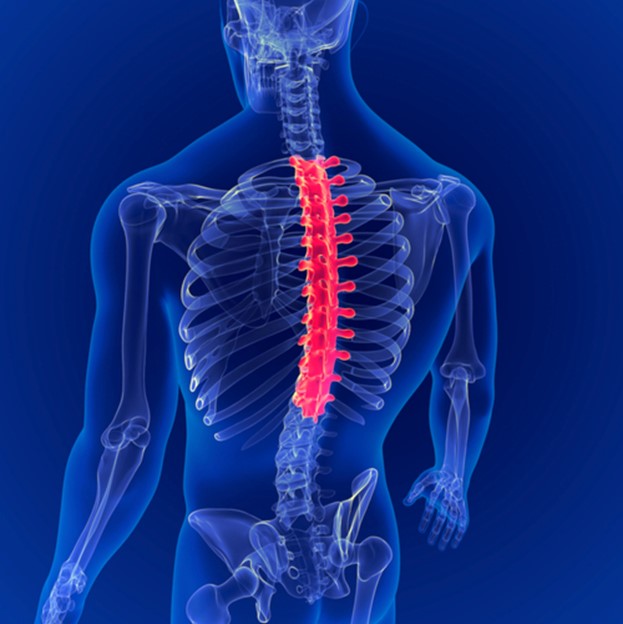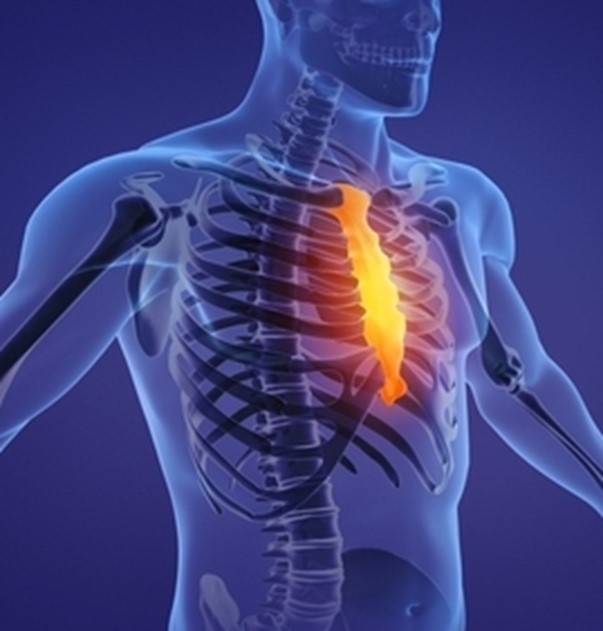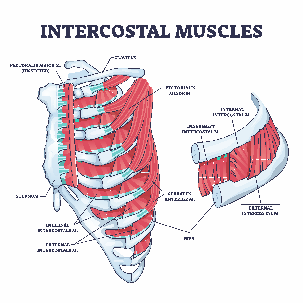Mid Back and Rib Pain
Middle back pain occurs in the thoracic or dorsal spine, to which the ribs are attached, that wrap around to protect the vital organs, heart and lungs and attach to the sternum in the chest. Mid-back pains are often associated with rib pain and it best really to often consider them very closely related.
Localised mid-back pain
Midback pain sometimes remains ‘localised’ in the back, does not travel around the ribs or cause breathing difficulty. Commonly this is between the shoulder blades or scapulae, higher up across the shoulders in the trapezius muscle region, or lower above the lumbar spine around and above the kidney area, or at a specific level of an old (commonly compression) spinal injury.

Referred pain from mid-back or rib strain
Referred pain from the ribs are often associated with neck pain, or pain radiating to the shoulder or arms or chest, and can also sometime give pain deep inside the chest, simulating pain from the heart, lungs, stomach or oesophagus.
Chronic mid-back pain
Chronic or long-term pain occurs when there is usually no injury, often due to poor posture, long periods of slouching. It can also be associated with postural deformities, Dowager’s hump or related to text neck, which pulls in the middle back. Treatment needs to consist of some Chiropractic treatment, but changes to poor work habits of slouching are essential, and Alexander Technique can help in this regard. Other causes relate to increased kyphosis or curve in the thoracic spine, large breasted women or carrying loads repetitively for many years.
Acute mid-back pain
Acute mid-back pains can often give intense sharp pain and be simply horribly painful! The good news is that the pain does usually settle quickly, especially with Chiropractic treatment.
Common causes are:
- A twisting movement, such as turning in bed, twisting around in the car to reach something on the back seat, twisting at golf (trying to hit the ball too hard?)
- Sneezing, or severe coughing
- Sitting twisted for long periods of time, such as slouching twisted on the sofa or bed
- Lifting work with repetitive twisting, such as:
- luggage belt
- Digging in the garden, especially when we are not used to this kind of strenuous work, and ending up doing it for too long…
Rib Fractures ⚡️and Muscular strains
Rib fractures or muscular strains are the most common cause of acute mid-back pain. My experience is that a rib strain can be as painful as a rib fracture, if there is severe acute muscle spasm involved. Patients are often surprised, as they say there was no injury, I just woke up with the pain, or got up from sitting (slouching). With both rib fractures and strains, Chiropractic can dramatically speed up the healing process and help prevent the weeks of pain turning over in bed at night or getting up out of the arm-chair.
Rib, Costovertebral or Costotransverse Joint Strain
Please note the medical word for rib is ‘Costal’ or ‘Costo‘. The ribs attach and articulate to the mid-spine at the costovertebral joint and costotransverse joints. These joints can sprain and cause pain in the back, commonly to the side of the spine, near or ‘under’ the shoulder blades.
I’ve put my rib out!
The feeling or a rib ‘going out’ displacement or subluxation, usually occurs at the costovertebral or the costotransverese joints. What happens is that the supportive ligaments around these joints are sprained or stressed, which can again follow trauma, or simply due to prolonged bad posture.
Chiropractic ‘adjustments’ can often help tremendously to release the tension in the associated tight spinal joints and intense muscle spasm.
CostoChondritis
The costal cartilage is cartilage that connects the ribs with the sternum, and are very elasticity to importantly permit movement of the chest in respiration. When this cartilage becomes strained it is called Costochondritis. It can give pain in the sternum (costosternal syndrome) or chest wall pain syndrome. It Commonly affects the 2nd to 5th ribs.
Tietze syndrome
Tietze syndrome is very closely related to CostoChondritis, and is a benign inflammation, commonly the 2nd and 3rd ribs. The acute pain from Tietze syndrome is a common reason for hospital emergency visits and is frequently misdiagnosed as angina or heart attacks.
Tietze syndrome has swelling of the costal cartilages, which does not appear in costochondritis.


Intercostal Muscle Spasm
The acute sharp pain from a rib strain can often be a spasm in the muscles between the ribs, called the intercostal muscles. It is these muscles that can spasm and cause intense sharp pain on a deep breath in, or inspiration which can cause you to worry about a heart attack if you haven’t had any noticeable injury.
Rib pain tends to be acute in nature and therefore respond very quickly, usually within a few chiropractic treatments.
Rib, mid-back and shoulder pain.
The upper ribs and upper back also work together with the shoulders.
The shoulder blades or scapulae need to glide and move over the ribs, with smooth scapulo-thoracic movement to give full free shoulder movement.
Rib and upper back tightness or dysfunction reduces the scapula movement, in turn leads to reduced Shoulder movement, that can lead on to a rotator-cuff injury of the shoulder muscles.
Symptoms of Rib Pain
- Pinpointed chest pain. If a sharp pain seems to be coming from a very specific location
- Pain moves and varies left to right, which may include down the arm or up to the neck.
- Pain on twisting and moving
- Pain when you take a deep breath in. This is spasm of the intercostal muscles – between the ribs, that prevent the ribs from separating on inspiration. It can be very sharp pain, and worrying.
- No signs of being medically unwell, such as cold sweat, shortness of breath, dizziness, nausea, vomitsing.
- Signs and symptoms that can indicate a costovertebral joint sprain are:
- Tightness through the chest. With the inability to stand up straight
- Pain on coughing, sneezing or twisting, or poor breathing patterns
- Decreased range of motion – twisting and bending feels very limited.
Chronic Cough with Rib and Chest Pain
- Asthma: Wheezing with shortness of breath
- Bronchiectasis: Coughing due to mucus build-up in the lungs.
- Bronchitis: Coughing due to mucus and swelling in the bronchial tubes.
- Chronic obstructive pulmonary disease (COPD): Chronic bronchitis and emphysema.
- Upper respiratory conditions like flu, pneumonia and colds
- Pneumonia or Tuberculosis
- pleurisy, pleuritis or pleuritic chest pain with inflammation to the lining of the lungs, commonly after infections such as pneumonia or tuberculosis.
Other Causes of Rib and Chest Pain
There are several other causes of rib pains, that must be considered:
- Heart attacks (see also Rib Strain vs Heart Attack with Chest Pain)
- Fractures or infection of the ribs, rib cartilage injury
- Rheumatoid Arthritis
- Osteoporosis often with old age, Vitamin D deficiency or Chronic steroid use.
- Osteochondritis
- Lung or rib (bone) cancer or Multiple Myeloma
Chiropractic Treatment of mid-back and rib strains
Acute mid-back and rib strains are treated very well with chiropractic, often settling in a few days.
Treatment consists commonly of:
- Manipulation of the middle back.
- Deep muscle releasing to the associated muscles spasm often in the Rhomboid, Trapezius, Latissimus Dorsi, and rotator cuff muscles
- Treatment to the Neck or cervical spine which is often involved
- Treatment to the lumbar spine if there is associated lower back pain.
- Ice treatment is often required if the injury is acute and inflammation is present.

Prevention of mid-back injuries
The clear message is to avoid the repetitive strains!
- Learn not to twist when lifting or bending
- Stop the repetitive twist and lift (Baggage handlers have learnt this the hard way)
- Avoid the slouching or twisting on the sofa or bed
- Avoid sitting up in bed with the back curled up
- Avoid sitting working on the laptop on the sofa
🆘 Rib Strain mimicking a Heart Attack with Chest Pain
Acute pain from rib strains that give pain on breathing in can so often lead to clients fearing a heart attack that I have written a separate article about Rib Strain vs Heart Attack with Chest Pain
Chronic Mid-back and rib strain
I have had a few amazing success with treatment to clients who’ve come in with long term sternal and chest pain, having seen doctors, had lots of scans and investigations, and medical treatments of NSAID’s, anti-inflammatory drugs, Omeprazole for reflux none of which helped. Within a few treatments the pain has settled well.
(Alison Suter & John Shayler) – See Case Histories.